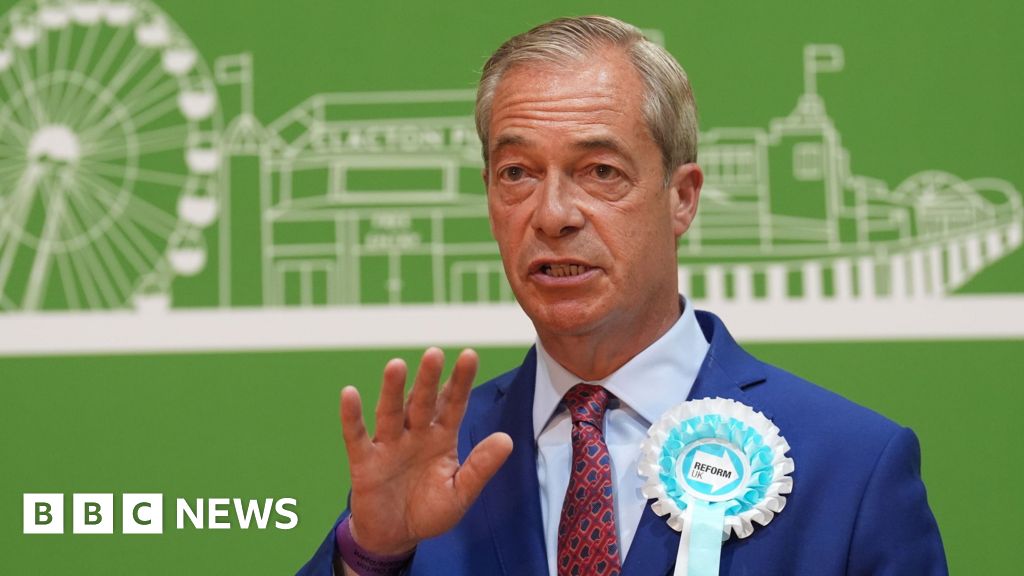- Author, Becky Morton
- Role, Political reporter
-
Nigel Farage has been elected as an MP for the first time, on a night which saw Reform UK take more than four million votes.
The party is on course to be the third largest party in the UK by vote share and has won four seats so far.
Mr Farage overturned a Conservative majority of more than 25,000 to comfortably win in Clacton, Essex – a race which marked his eighth attempt to enter the Commons.
He said the result was “the first step of something that is going to stun all of you”.
Reform also gained Great Yarmouth and Boston and Skegness from the Tories, while former Conservative MP Lee Anderson – who defected to Reform in March – retained Ashfield in Nottinghamshire.
The party drew large support in areas where the Conservatives won in 2019 under Boris Johnson, coming second in many constituencies.
Speaking to reporters after the result, Mr Farage said it was “the beginning of the end of the Conservative Party”.
Taking further aim at the party during his victory speech, Mr Farage said: “There is a massive gap on the centre-right of British politics and my job is to fill it.”
Mr Farage said Reform would “now be targeting Labour votes”.
He continued: “What is interesting is, there’s no enthusiasm for Labour, there’s no enthusiasm for Starmer whatsoever. In fact, about half of the vote is simply an anti-Conservative vote.
“We’re coming for Labour, be in no doubt about that.”
He has previously said he is aiming for Reform to become the main opposition to Labour by the time of the next election.
An earlier exit poll for broadcasters had forecast the party would win 13 MPs, more than many polls during the campaign had predicted.
However, the figure was highly uncertain, as the model suggested there were many places where the party only has a relatively low chance of winning.
Polling expert Sir John Curtice said Reform had benefited from a significant fall in the Conservative vote in seats the party had previously held, as well as advancing most in areas where people voted Leave in the 2016 referendum.
In all four seats won by Reform, more than 70% of people voted for Brexit.
Reform UK chairman Richard Tice overturned a 27,402 Tory majority to win Boston and Skegness.
Meanwhile, in Great Yarmouth, businessman and former Southampton FC chairman Rupert Lowe beat the Labour candidate by 1,426, with the Tories slipping to third place.
In an early sign of Reform’s success in winning over former Tory voters, the first two results of the night in north-east England – in Blyth and Ashington and in Houghton and Sunderland South – saw the party beat the Conservatives by more than 4,000 votes.
The pattern was repeated in a number of other seats, as the Tory vote share plummeted.
However, Reform had less success winning seats off Labour.
In Barnsley North, where the exit poll had forecast a 99% likelihood of Reform taking the seat, Labour held the seat with an increased majority of 7,811.
In Hartlepool, another seat forecast to go to Reform, Labour also held on comfortably with a majority of 7,698.
At the same time, he took over from Mr Tice as Reform’s leader and he has played a prominent role in the party’s campaign.
The former UKIP and Brexit Party leader has stood unsuccessfully to be an MP seven times, most recently in South Thanet, Kent, in the 2015 general election, when he finished second behind the Tory candidate.
Clacton was the first constituency to elect a UKIP MP in 2014, after former Tory MP Douglas Carswell defected to the party and triggered a by-election, which he won.
In 2019 Reform’s previous incarnation, the Brexit Party, stood aside in more than 300 seats previously won by the Tories, amid concerns it could split the pro-Brexit vote.
However, this time the party contested 630 seats across England, Scotland and Wales.
Fielding an almost full slate of candidates in Great Britain posed challenges for the party.
Reform has had to disown six of them over offensive comments since nominations closed.
The party has blamed the surprise announcement of a July election, as well as claiming a company it hired to conduct background checks on would-be candidates failed to carry out vetting before the election was called.
However, it was too late to remove any of these candidates so they still appeared for the party on ballot papers.
What questions do you have for the new government?

William Turner is a seasoned U.K. correspondent with a deep understanding of domestic affairs. With a passion for British politics and culture, he provides insightful analysis and comprehensive coverage of events within the United Kingdom.








